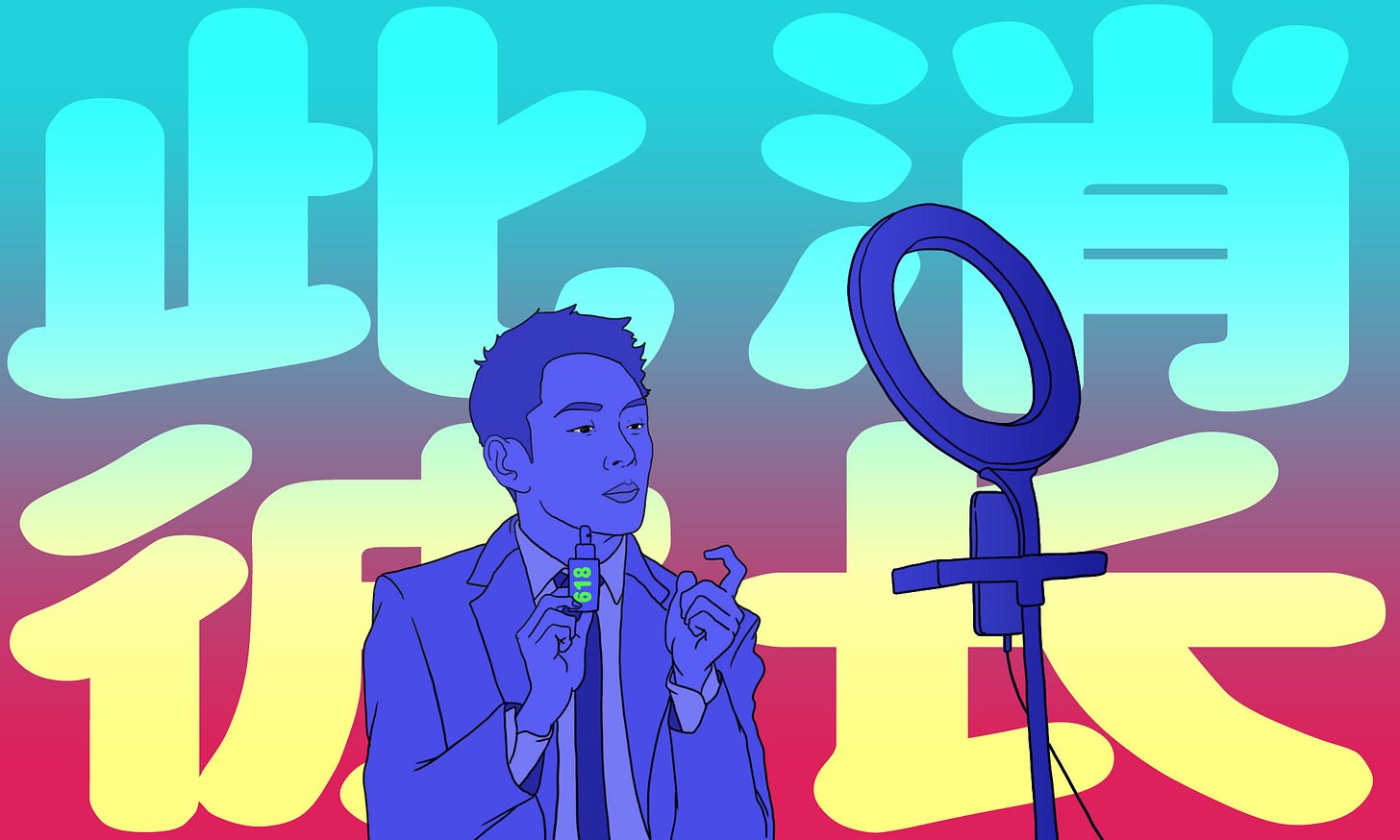Welcome to RealTime Mandarin—a multimedia resource to immerse you in the latest Chinese language trends, inspire you to practice and improve your Mandarin every week, and empower you to communicate with confidence.
Subscribe now to get the next issue straight to your inbox!
The 618 shopping festival is China’s second largest online shopping event.
Started by JD.com in 2010, it’s held on June 18 every year. That date (“6 - 18”) is the finale, which marks the end of the weeks-long festival, with some platforms starting promotions as early as May 20 this year.
Over the last two years, JD.com and Alibaba, the two main e-commerce platforms in China, have not published their sales figures, normally tracked in “GMV” (Gross Merchandise Value).
That’s because sales in 2022 and 2023 suffered due to the impact of the economic downturn in China.
This year platforms seem confident that a corner has been turned. According to Alibaba, more than 37,000 brands doubled sales on their platforms so far this 618; similarly, JD says over 10,000 brands saw transaction volumes increase by over 500% year-on-year in the first four hours of the festival.
And livestream ecommerce (电商直播), where influencers sell products live to their fans through streaming platforms, has continued to be an important way in which consumers buy.
But behind the headlines, the 618 shopping festival is changing.
And these changes indicate wider consumer trends happening in China.
Here are three consumer trends being discussed in the Chinese media coverage of this year’s 618 shopping festival.
Trend 1: Influencers are becoming less influential
The impressive preliminary sales data does not tell the full story.
This year’s 618 has been the most challenging yet for livestream sellers, according to Austin Li (李佳琦), known as China’s “Lipstick King”, a top influencer:
This year is the toughest [618] yet.
今年是最难的一届。
Of course, Austin has still not fully recovered from his reputation-damaging fall-out of the 79 yuan eyebrow pencil incident which we discussed last September.
(Although it lost him millions of dollars of revenue, it was a good thing for this newsletter, because it was also the source of a number of well-known internet memes and phrases which we love!)
But it’s not just Austin Li who’s having a tough year. Other influencers are suffering too.
Often divided into “first-”, “second-”, and “third-generation”, top-tier influencers like Simba 辛巴 (first generation, along with Austin Li), Little Brother Yang 小杨哥 (second generation), and Dong Yuhui 董宇辉 (third generation), are all cutting their livestream air-time this year.
And some are even diversifying their businesses away from livestream ecommerce altogether.
That’s because sales are falling dramatically for many influencers. According to some reports, the GMV of some livestream sellers has fallen by as much as 80% this year.
Trend 2: Own-brand livestream is on the rise
That’s not to say people are not buying, however.
While influencer-based sales are falling, brands are choosing to sell their products through their own livestream e-commerce studios (known as 自播间).
For them, this removes the “middle man”:
Today, the GMV generated by a brand’s own livestream studios is already considerable, especially during the promotion periods. This is taking away some of the traffic that would go to influencers who act as retailers. “It is as natural as the ebb and flow. There is only so much traffic. If more goes to the brand’s own livestream room, then the influencers will get less.”
如今,很多品牌自播间成交金额已经很可观,尤其是在大促期间,这就相当于分走了一部分原本属于主播的流量。“这是个此消彼长的过程,流量只有那么多,流向了自播间,流向主播的自然就会减少。” [2]
According to Jing Daily, RED 小红书, the social media and ecommerce platform, saw its number of brand-operated livestreams grow by 380% during this year’s 618.
Trend 3: “Refund only” policies are hurting sellers
Another common theme in the media chatter during this year’s 618 shopping festival is an increase in the number of product returns, and refunds.
Like this story, which circulated widely on the internet over the last couple of weeks:
I have a friend who sells women's clothing on Douyin. In this year's 618, his store has a turnover of about 10 million yuan, out of which 3.5 million yuan has been returned to the customers through the "refund only" policy, 3.8 million yuan refunded via "return and refund". It is still unclear if he can pocket the remaining 2.7 million.
自己的朋友在抖音电商平台上卖女装,618期间其店铺的营业额为1000万元左右,但“仅退款”数额为350万元、退货退款数量为380万,剩下270万还是未知数。
It’s this “Refund Only” policy (仅退款) which is causing distress for many merchants.
Introduced by PDD in early 2021, under this policy, customers are eligible to receive their refund without returning the product, putting the sellers at risk of losing both their money and goods.
According to some reports, the “refund only” returns in some product sectors this year is as high as 35%.
So, a combination of falling consumer confidence, damaged reputations of “cancelled” (or partially cancelled) influencers, and the “price wars” between platforms (and the aggressive policies that come with that competition) is forcing the business model of livestream ecommerce to change.
It’s a business model which made a small number of influencers incredibly rich and influential. That’s now changing towards a model where brands directly own the relationships with their customers, who are more discerning and price sensitive than they used to be.
So that’s what we're exploring this week!
Favourite Five
1. 仅退款 jǐn tuì kuǎn
"refund only" policy
“仅退款”的售后机制发源于拼多多 - The "refund only" policy was first introduced by Pinduoduo. [3]
2. 卷低价 juǎn dī jià
compete on price
为了适应平台的“比价”环境,公司也陷入了“卷低价”的怪圈 - To survive on platforms that encourage price comparison, businesses have also fallen into the trap of competing on low prices. [1]
3. 此消彼长 cǐ xiāo bǐ zhǎng
come and go
明年应该会出现各平台业务此消彼长的情况,“内卷”加剧 - Next year some platforms will be more profitable (for livestream e-commerce) while others will be less so, and the competition is only going to get more intense. [1]
More: Read more about this phrase in the Sinica Phrase of the Week tomorrow.
4. 去主播化 qù zhǔ bō huà
de-emphasize influencers
公司尝试去主播化,更多关注产品端和服务端 - Businesses will try to focus more on the products and services instead of relying on influencers to gain customers. [1]
Related:
自播间 zì bō jiān - “own broadcast studios”, brands selling their own products in their own livestreams
头部主播 tóu bù zhǔ bō - top influencer
腰部主播 yāo bù zhǔ bō - mid-tier influencer
5. 劣币驱逐良币 liè bì qū zhú liáng bì
bad money drives out good
在这种劣币驱逐良币的直播电商环境之下,越来越多的消费者会逐渐发现,不如去线下消费 - In livestream e-commerce, where bad money drives out good, more and more consumers will gradually realize that it’s better to shop offline.
More: Originally Gresham’s Law which has become a common idiom-like saying in China.
Consuming the Conversation

Useful words
6. 失言 shī yán
misspeak
高管“失言”引发东方甄选股价大跌 - An executive's misspoken words have caused a sharp drop in East Buy’s stock price. [1]
7. 隐退 yǐn tuì
retire from the public eye
头部主播的普遍收缩,甚至出现了头部主播“隐退”的趋势 - Top influencers are getting less air time with some who have exited the industry. [1]
8. 惨淡 cǎn dàn
bleak
一批头部美妆主播的带货GMV,与去年同期相比近乎惨淡 - The GMV (Gross Merchandise Volume) of top beauty influencers was bleak compared to the same period last year. [2]
9. 砝码 fǎ mǎ
leverage, weight
越来越多品牌开始布局自播,押注在头部主播身上的砝码逐渐减少 - Brands are increasingly opening their own livestream studios while betting less on the top influencers. [2]
10. 反制 fǎn zhì
counteract
这或许是目前商家“反制”买家的一种最有效的手段 - This might be the most effective way for merchants to counteract buyers at present. [3]
11. 哭诉 kū sù
complain tearfully
在这场女装商家的“哭诉”中,“仅退款”所占的比例令人大跌眼镜 - In this tearful complaint from a women's clothing merchant, the proportion of "refund only" returns was astonishing. [4]
12. 比拼 bǐ pīn
compete
在“价格战”之外,服务层面的比拼也逐渐走向台前 - Beyond the "price war", the competition on services is also becoming more prominent. [4]
Three-character phrases
13. 依存度 yī cún dù
interdependence
反映了头部主播和平台之间依存度的微妙 - It reflects the subtle interdependence between top influencers and platforms. [1]
14. 借东风 jiè dōng fēng
take advantage of an opportunity














